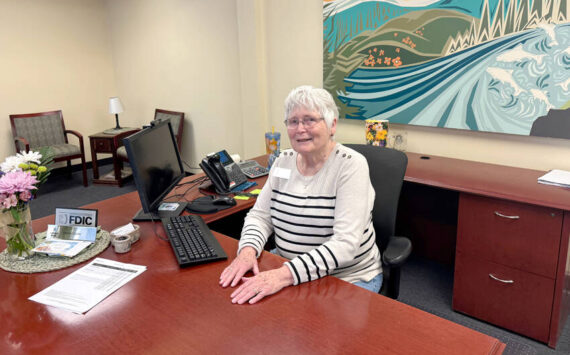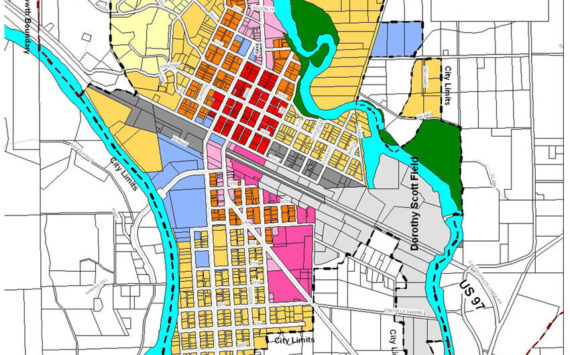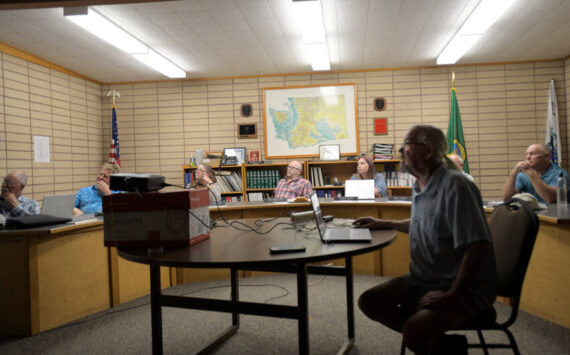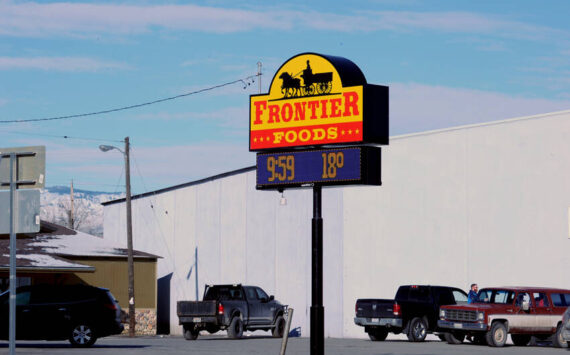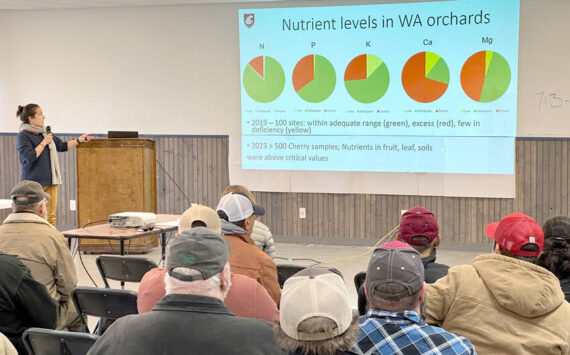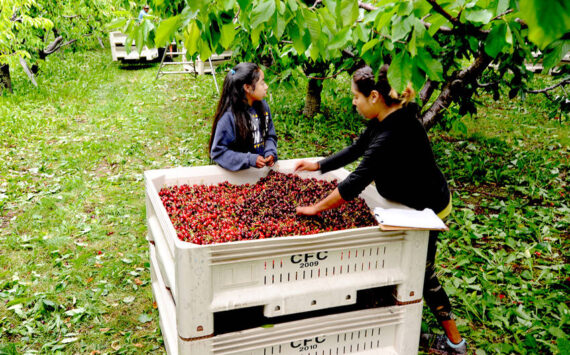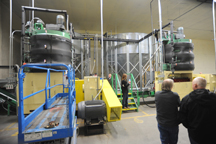
Vo-Ag teachers Walt Arnold from Oroville and Matt Debach from Tonasket get a look at Carbon Cycle Crush’s Oroville canola crush plant last Monday. Debach also brought several FFA students to tour the operation. Photos by Gary DeVon
OROVILLE – Carbon Cycle Crush proved it can be done as 10 tons of locally grown canola seed from the Havillah area was pressed into oil and meal before invited guests last Monday.
The crushing took place following a luncheon put on by the company which has built its plant in the old Oro Fruit warehouse on Appleway Ave. The CCC’s goal is to crush 50 tons of seed a day in three shifts, 24/7. To start the company will be mostly crushing imported Canadian-grown seed from the prairies of Alberta and Saskatchewan, but to crush more locally-grown seed like Jim Bunch’s that was being crushed that day is also a goal.
Prior to the start up of the seed press, an emotional Carbon Cycle Crush vice-president Ryan Skinner thanked several people for their help in getting the plant to this point. Then company president Tim King, a former employee of the USDA made a presentation of the company’s goals, including replicating similar plants in several locations throughout the state and perhaps Canada.
“This thing has been stuck in my brain for a lot of years and finally it looks like what’s been bouncing around in my brain,” said King.
King said there are three legs supporting the plan – it must be economically, environmentally and socially sustainable.
“It’s like a three-legged stool if you remove one it falls over,” he said.
While working with wheat farmers with during his time in the USDA King said he saw a problem with all the wheat that was loaded on boats and was sent elsewhere out of the country. He said he felt many of the jobs that went with that crop left with the wheat. In 1978 he said he went to Canada and “stole some mustard seed called canola.” By early 1980 he had farmers with 100,000 acres of the canola planted. The problem was he couldn’t find anyone that wanted to build a crush plant. Twenty years later as times have changed there have been what he calls grandiose ideas about what a crush plant should look like. King was thinking much smaller and being able to replicate the idea in many locations, locating plants near the farms where the product was being grown. He also knew that canola was Canada’s biggest crop and that they were only able to crush about half of what they grew concentrating mostly on producing food-grade canola oil.
“A successful operation has to be sustainable, just like the farm,” said King. “This is just a cookie cutter operation and we hope to stamp out many more just like it.”
Several things came together to bring King to Oroville, including the recently designated heavy-haul corridor from the border to Oroville’s railhead and the fact that Canadian farmers were looking for new markets for the seed as traditional Asian markets were starting to buy locally grown canola on an increasing basis. Rather than have farmers ship their canola from the prairies of Canada to the Port of Vancouver, B.C., King reasoned the trucks could turn south and bring their produce to Oroville.
Eventually CCC hopes to form what it calls Carbon Cycle Parks and these might include energy generation through gasification – turning waste into energy through the use of a plasma arc, something the company has talked about before. He said he had travelled to Germany to look at some of the gasification operations going on there.
After the presentation the switch was pushed and canola seeds stored in massive hoppers were fed into a unit above the press that warms the seeds up before crushing, helping to extract more oil. Oil came out of one end of the machine while the meal comes out the back onto a conveyer belt for storage. While oil is the main product of most crushing plants, King emphasizes the importance of the meal as a value-added product. The meal can be mixed one part to four with animal feed to produce a high-protein feed with large amounts the Omega-3 fatty acids prized by dairy, beef and poultry producers.
“I need that guy who says I love that meal and I’ll pay what you’re asking… as well as the guy that says I love that oil and I’ll pay what you want for it,” King said.
The company has been encouraging local farmers to consider growing canola since they’d have lower hauling costs it should end up being less expensive to grow than the canola that has to be shipped from Canada to the U.S.
“Even though there would be less cost to ship we’d still pay the local grower the same amount we pay the Canadians who have to ship it farther,” he said. “If you grow Number 1 seed we’ll pay you Number 1 prices, but if you grow green seed we’ll still pay you for that because we can crush that too.”
King and CCC envisions a company that provides sustainable jobs with the potential for local farmers to participate in growing a valuable crop and becoming part of the CCC family.
After the 10 tons of seed is crushed the plant hopes to crush 50 tons a day, eventually increasing to a max of 100 tons or two truck loads. King said the company had to do some work with the Canadian government and Canadian export banks to get the wheels rolling on shipments from Canada.
“When we run out of these 10 tons we will hopefully have a truck waiting for us today or tomorrow and then the Canadian trucks will just keep rolling in,” King said.
